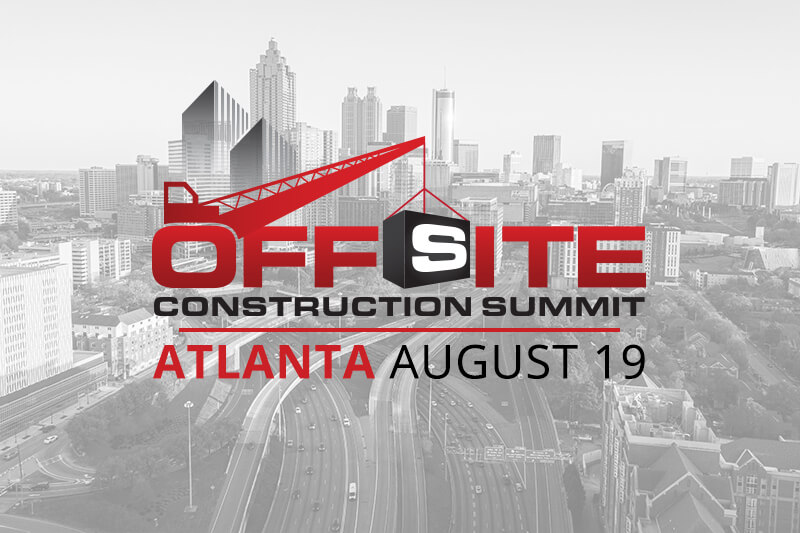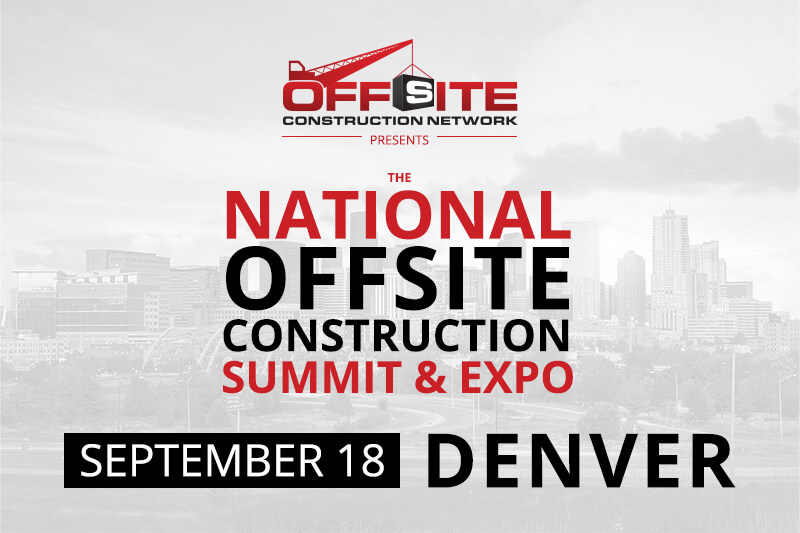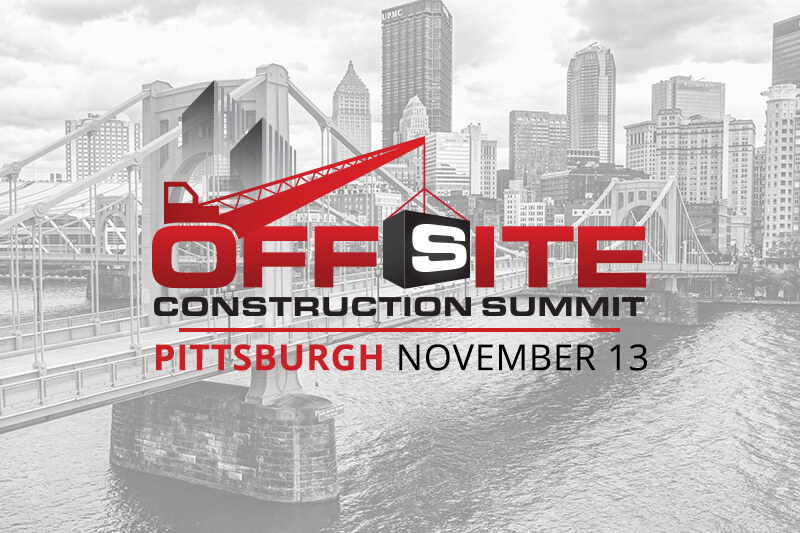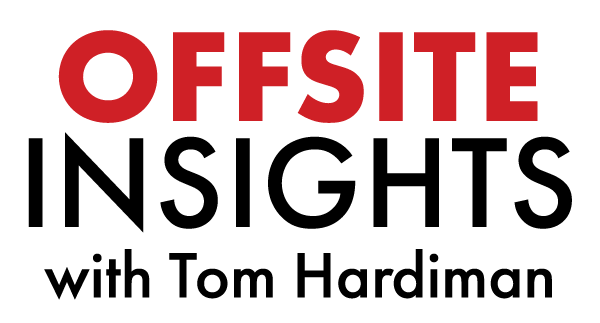
Enhancing Efficiency: The Importance of Collaboration in Offsite Construction
An interview with Landon Boucher, Director of Design Engagement from MiTek
Tom Hardiman and Landon Boucher discuss the evolution of offsite construction technology, highlighting the importance of collaboration between engineers, builders, manufacturers, and framers. Landon also shares details on MiTek's innovative product that addresses limitations in floor and ceiling framing in modular manufacturing.
Interview transcript
Tom Hardiman
Hello, and welcome to another edition of Offsite Insights, the show where we talk to leading experts and professionals in the modular and offsite construction space. I'm very excited today to have with me, Landon Boucher from MiTek and Landon tells me that is the proper way to pronounce it. Landon, how are you doing today?
Landon Boucher
I'm doing good, Tom. How are you?
Tom Hardiman
I'm doing great. Thanks for asking. I appreciate you joining me here today. Just wanted to share with some of our viewers a little bit about who you are and your company, MiTek. Then we'll just jump right into it. Why don't you just tell us a little bit about your background and how you ended up in this space.
Landon Boucher
Sure, I appreciate that. Well, I got introduced to the building industry just in general, as a young man working for In and Out Burger. Then from there, I ended up in a position where I was doing truss design and sales for a truss manufacturer. Then that company shut down their operations in Southern California, where I'm based out of during the recession. I ended up working for another building materials manufacturer. I did that for a number of years and then found my way over here to MiTek. All the different things that I've done, and the different teams I've worked with over the years, I've always been involved in offsite construction. Even going back to my early days doing trusses. Provided trusses to a number of manufactured home builders, modular home builders and that sort of thing. So, I've always just had an interest in that part of our industry, how to how to grow it, how to expand it. We've all been working together over a number of years, now we've seen it taking off quite extensively.
Tom Hardiman
Yeah, it's interesting you mentioned the roof trusses. A lot of people don't realize just about every project you work on has some degree of offsite component for us. We just carry that contingent on MEP systems all the way up to the whole building. So, good point. Nothing new. Anytime you can work in In and Out Burger in your intro, that's always good.
Landon Boucher
It’s always a plus. Trusses we've sort of, some ways take them for granted, right? We've gotten so used to them just being sort of normal, but it wasn't always that way. Plated trusses didn't even exist up until 1955, when an engineer named Cal Duryea developed the first metal punch tube plate. That was the start of MiTek. Today, they're fairly commonplace, particularly within the US. It was a journey. So, I look at that and there's a lot of perspective and knowledge to be gained there with the history of trusses that can be used with some of the other forms of offsite. It's not an easy journey. It's one you got to really stay the course and we have to work together to be successful.
Tom Hardiman
That's interesting that you used that roof truss analogy. Someone else I was talking to used the cabinetry analogy. A guy used to come to your house, build your cabinets, put the hinges in, and we don't do it that way anymore. Going back to 1955, that kind of dispels this idea that this whole notion of modular and offsite is some new fad. It's like, no. It's an evolution. It just kind of continues to change, improve, update and progress. As it should and we're still working on that, obviously. Which is where MiTek comes in. Now, tell us a little bit about who MiTek is, what you guys do and why you're interested in this offsite space.
Landon Boucher
Sure. Well, like I already explained, the start of MiTek really was offsite construction. Just as our industry has evolved, so has MiTek. We've evolved and we've expanded. In the beginning, like I said, it was just strictly plated roof trusses. Years later, we added in the technology for plated floor trusses. Then we've got the shear walls. We've got a product called Hardy frame that is used in both modular, panelized and traditional stick frame construction to allow for the shortening of the length of your shear walls. That was the very first product of its kind just like other innovations within MiTek. So really, our goal is to work with the industry. Engineers, builders, manufacturers, framers, to work together to enable more optimal use of offsite construction solutions. We call that design make build. Design build has been around for quite some time, but we want to bring the manufacturing part of that process in at the right time. We see ourselves as the folks that are well suited to do that. To act as a bridge builder between the design build and bring that manufacturing component within that framework.
Tom Hardiman
Okay. You mentioned you're in Southern California. In a couple of weeks, you’ll be at our Offsite Summit in Berkeley, California. What markets is MiTek in or is it just whatever the plant manufacturers in? What can attendees at this Berkeley Offsite Summit expect to see or hear from you guys?
Landon Boucher
Sure. Well, there's a number of things. In terms of markets that we're in, we're a global company. So really anywhere that wood framing is taking place, MiTek plays a role in that effort, particularly to advance the use of offsite construction. We have other segments that we're in for more commercial high rise steel type structures as well. Particularly when it comes to the Berkeley Offsite Construction Summit, one of the things that we're looking forward to sharing with all the attendees is a floor truss solution that we have what we call Posi-Strut. And Posi-Strut is particularly beneficial, I believe, to modular manufacturers. As those of us that are in this industry know, there's the floor ceiling, then there's the ceiling framing, and you have that connection with the mods. When you're trying to move all of your different utility lines through there, it can be difficult within that space. Particularly because you’ve got building height limitations. So, some factories, utilize an eye joist for the floor framing, and then a two by six or two by eight solid sign joists for the ceiling framing. And both of those are enclosed and don't allow for easy routing of things like ductwork, fire sprinkler lines, whatever it might be. Having an open web trust solution that's available in shallow depths, I think is very beneficial to a number of different types of projects, but particularly to modular. We have been as shallow as nine and a quarter. For instance, you can use 11 and seven eighths on your floor framing, a nine and a quarter on your ceiling framing, and have all that open space around whatever utility lines you need to.
Tom Hardiman
Excellent. That's really awesome to hear kind of new products and innovation, specifically more aimed at the modular industry. So this is a fairly new product you’re offering. I'm wondering what kind of feedback you're getting.
Landon Boucher
Yeah, sure. So, years ago, NBC used to run their reruns during the offseason. They would say if you haven't seen it, it's new to you. That sort of like Posi-Strut. It's actually been around for quite some time. Throughout Europe, Australia and the Asian markets that we serve, it's really commonplace. It is the predominant floor truss that gets utilized and roof truss for that matter. As we know, within the US, we've commonly used deeper floor framing assemblies. We've used more of the traditional wood web assembly. However, when a shallow depth floor is needed and you'd like to still have that open web solution, Posi-Strut makes a great deal of sense. Modular, because you’ve got the floor and the ceiling framing, you're really tight on limitations.
Tom Hardiman
Right, exactly. So, you kind of lead me down the path here with innovation and continuous improvement and efficiency in our industry. You've been in a lot of our factories. I would say it's fair to say that not all of them are highly automated or robotic. We got a few of them up here, but for the most part, I think there's room for efficiencies to be gained in our factories fair to say. How can MiTek help in that capacity? A lot of times people hear software or automation or machinery, and they just immediately start seeing big dollar signs and get scared. I think our industry, just like the construction industry, is kind of stuck in our own status quo sometimes. How do you help overcome some of those kind of initial we’re not interested?
Landon Boucher
That's a great question and a great point. The modular industry or offsite construction industry is fantastic. There's a lot of growth, a lot of innovation that's taking place, but there are some that are maybe more advanced than others. Then there's others that maybe have a willingness but don't necessarily know where to go. Like I want to utilize more advanced technologies, but I'm not exactly sure which ones to utilize and then I'm not sure how to implement them. I think that's where MiTek comes into play. Obviously, we've got a lot of really great work and great solutions when it comes to software, automation and other types of technologies. I think one of the things that sets us apart is the how to. As an industry, we're really good and particularly MBI is really good at educating the industry on why.
Tom Hardiman
Why? What are the benefits?
Landon Boucher
I believe there's specific partners that sort of fill in those other gaps. There's a lot of great manufacturers that can provide the what. Like, hey, what do I use to advance offsite. Certainly, MiTek is one of those. I think the thing that really sets us apart is the how to. We can come in as subject matter experts if you will and really help enable these factories, with not just our solutions, but also how to utilize them. How to get the most out of these solutions so that you see that return on your investment that is oftentimes promised, but not always delivered.
Tom Hardiman
You're spot on, at least with my way of thinking. I've been in this industry for about 20 years, and we've been doing these offsite summits since I think 2014 or 2015. So, going on 10 years now. We've kind of said the same thing internally. Ten years ago, we were still selling the advantages of modular and offsite. Why should you do this? Why? Now many people are saying, I get it. Faster schedule, it’s greener, I get it. How do I incorporate this in my next project? Now it's getting down to business.
Landon Boucher
It's a good place for us to be as an industry, but now we've got to have people that can give those kinds of answers.
Tom Hardiman
Yeah, I'm very grateful that companies like yours are out there to do that because I'm not an engineer. I would say I don't know how, to talk to Landon. That's why he's in this space. So yeah, I mentioned a global company. Berkshire Hathaway, I think I've heard of them. They’re parent company. They’ve been known to own a few good companies so that should give people some peace of mind. Everyone's heard of MiTek in our space, but maybe a lot of folks didn't really realize exactly what you do. So, I'm glad you kind of helped explain that. But this notion, I guess it's for me, is continuous improvement. I've never liked when people say, the modular or offsite revolution, like it was this big event that happened and now we're out there. I've never seen it that way. I've seen it as an evolution. Always kind of growing and learning. Sometimes you take a step back, and sometimes you take two steps forward. I've never seen this one big explosion. A lot of people don't have the patience for that, but like I say, we look back and market share was 2%, seven years ago, and it's a little over 6% now.
Landon Boucher
It’s a big jump. Honestly, I credit that to MBI. As you said, people do say it's a revolution. For those of us that have been in it, it's not. It’s an evolution, to use your terminology. The marketing maybe wasn't quite there. John and others have done such a great job of getting the word out and letting people know, like, really, what this is. Again, the how do I benefit from this? I think that's what's made the difference. For those that haven't been involved in this segment of the building industry for a number of years, it does seem like a revolution. To use what I talked about with Posi-Strut. If you haven't seen it, it's new to you, but it's certainly not new.
Tom Hardiman
Yeah. We’re doing four smaller regional summits this year. We're going to see you in Berkeley on June 5. We've got Minneapolis in June, and then we're doing Denver and Atlanta. We started these for this exact reason. It's to give people, owners, developers, architects a place to say I'm hearing about this, where can I go to learn about it and talk to people in my region about this? So that's why these were set up. People can come there and learn from experts in their areas. If they want more, hey, here's 20 people in your region that can help you out. I'm glad to hear you're going to be at several of these it sounds like.
Well, John, what else is? I butchered that one. We'll have someone edit that out. It’s because we were talking about McMullen. The marketing guy is always on my mind, I guess. What else is going on, Landon? Where else are your travels taking you to these days? I see you're in a hotel room today. So, you're obviously on the road.
Landon Boucher
I am in a hotel room today. I've been in a lot of hotel rooms as of late. So, MiTek recently launched a whole new team across the US, actually across the globe. It was going to be just the US, but we saw such success and such greater need for it internationally that we've launched this effort we call design engagement. For years, we've had a handful of folks within MiTek. Engineers, others that would work with the design make build community, to help optimize the design of different types of buildings, but has never been a truly organized strategic effort for MiTek. Now we're doing it. We're taking that extra step to formalize a team and have folks based in specific regions to work with engineers, architects, framers, manufacturers, builders. Anybody that's involved in that design make build space to help optimize that process. We want the folks that are pursuing offsite, to get that return on investment that is always promised and not always delivered upon. We want to make sure that it gets delivered upon. And so that's the role that we're playing.
Tom Hardiman
I think that in a large part is what's leading to our industry growth. We're starting to see a lot of service and material providers that are putting resources towards modular and offsite construction, developing new products, putting teams together. We have these large material suppliers and billion-dollar companies and they'll have like one guy for all of North America for the modular industry. Now they're starting to say, let's show this love and see what happens. I think it will really start growing once the MiTeks of the world zoom in on this and help us become a better industry. So, that’s good to hear.
Landon Boucher
Together, we could do it. We're not going to do it alone.
Tom Hardiman
I'm not planning on going anywhere. We've known each other for many, many years, you've been on various industry committees, and we've kind of been around a while, but I'm very excited about the future of the industry. I think it's only going to continue to grow. The fact that we have companies like MiTek in this space is just validation for everything. So, it's a good partnership, I think.
Landon Boucher
Yeah, thank you. Well, that works both ways so the feeling is mutual.
Tom Hardiman
Landon, I appreciate you joining me here today. Just taking a few minutes to tell us what folks can expect, and I guess we'll be seeing you in Berkeley on June 5 at our next summit. For those of you online listening, try to join us there or find a regional summit. Minnesota, Denver and Atlanta if you can't make it to Berkeley. We'll catch you one of them. Thank you so much, Landon. We'll see you soon.
Landon Boucher
Thank you, John.
Tom Hardiman
John!
Landon Boucher
I did it too!
Tom Hardiman
That'll be on our blooper reel.
Don't Miss Our Upcoming Events!
Join the leading companies and professionals from across the offsite construction industry at each of this year's Offsite Construction Network events. With summits and expos taking place across North America in 2025, it's never been easier to connect with and learn from offsite construction manufacturers, designers, builders, and suppliers from the United States and Canada.
Subscribe today to get the latest updates on future events from the Offsite Construction Network.
